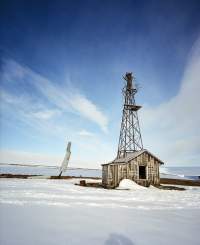Rising to Russia's Arctic Challenge
Wednesday, July 5, 2023
Written by Alan W. Dowd, ASCF Senior Fellow
Categories: ASCF News The Dowd Report

July 2023— Chief of Naval Operations (CNO) Adm. Michael Gilday recently raised eyebrows when he called for the U.S. and its NATO allies to start holding exercises in the Arctic on par with the RIMPAC exercises in the Pacific. RIMPAC enfolds 30 nations, dozens of warships, nearly 200 aircraft, and thousands of sailors and airmen. “I think that we could do the same up in the Arctic,” Gilday said.
Hopefully, Gilday’s words have gotten the attention of the White House and Congress—and America’s Arctic allies—because those words won’t matter to Vladimir Putin until they are backed up by ships, planes, and troops.
Building Up
Any discussion of Arctic security must begin with Russia—because it is Russia’s actions that are threatening the security and stability of the Arctic.
Even with his military tied down in Ukraine, Putin has expanded and modernized bases around and in the Arctic. Adm. Daryl Caudle, commander of U.S. Fleet Forces Command, reported in February that Russia now has six bases, 14 airfields, 16 deep-water ports, and 14 icebreakers across the region, girded by precision-guided weapons and S-400 air-defense systems—all yielding a “strong anti-access and access-denial capability that reaches from the Arctic to the Baltic.”
Eight of Russia’s 11 subs designed for delivering long-range nuclear weapons are based in the Arctic, as Reuters reports. Russia has tested new hypersonic missiles in the Arctic; conducted multiple airborne-assault exercises, amphibious landings, and large-scale wargames in the Arctic (some enfolding as many as 80,000 troops and 220 aircraft); revived the Cold War-era practice of testing America’s air defenses along Alaska’s frontier; flouted America’s exclusive economic zone off Alaska; and conducted large-scale maneuvers on the edge of Alaskan waters.
As a Canadian general at NORAD puts it, “This adversary—this competitor, Russia—has advanced on all fronts.”
Claims
Russia lays claim, without justification, to half the Arctic Circle and the entire North Pole—some 463,000 square miles of Artic sea shelf. Like Beijing in the South China Sea, Moscow has underlined its claims in a brazen military context: In 2008, for example, a Russian general revealed plans to train “troops that could be engaged in Arctic combat,” ominously adding, “Wars these days are won and lost well before they are launched.”
Why is Russia making such claims and committing so many military assets to the Arctic? The region represents a treasure trove of oil, natural gas, and potential shipping revenues. As the ice in the Arctic continues to melt, there will be $35 trillion worth of untapped oil and minerals up for grabs. The U.S. Geological Survey estimates the Arctic holds 1,670 trillion cubic feet of natural gas and 90 billion barrels of oil, equaling 30 percent of technically recoverable global reserves of oil and 13 percent of gas. (About a third of the oil is in Alaskan territory.)
The Arctic’s vast and rich bounty of natural resources will be increasingly recoverable and transportable because the Northwest Passage, once frozen throughout most of the year and navigable only by heavy-duty icebreakers, is thawing. An ice-free Northwest Passage will slash some 4,000 miles from existing Europe-to-Asia shipping routes.
A report by the Wilson Center explains that Russia needs new Arctic oilfields “to offset declines in production at its conventional, legacy fields and to maintain production at a level of at least 10 million barrels per day beyond 2020.” Oil and gas account for over 40 percent of Russia’s budget revenue. As Putin explains, “Natural resources, which are of paramount importance for the Russian economy, are concentrated in this region.” Thus, to keep his economy going—and keep his oligarchs happy— “Russia must make huge investments in exploring and recovering oil from...the east Siberian region and the Arctic shelf,” as a study conducted by the American Enterprise Institute concludes.
Justifications
Add it all up, and Russia appears to be employing a strategy by which claims will justify possession, and possession will justify claims.
The next installment of this series will explore what the U.S. and its Arctic allies are doing—and what more they need to do—to answer the threat posed by Putin’s militarization of the Arctic, to block Putin from attempting his salami-slice tactics in the Arctic, to deter Putin from extending his war of neo-imperialism into the Arctic, and to ensure that the Arctic’s resources are developed in a transparent manner governed by the rule of law.











